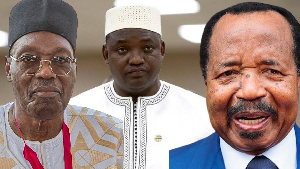For nearly six years, Nigeria has struggled without success to contain a devastating terrorist campaign by Boko Haram resulting in over 35,065 deaths from January 2011 to March 2015 according to the Nigeria Security Tracker produced by the Council on Foreign Relations.
The group’s tactics have evolved from gun attacks and bombings on government installations, attacks on churches, mainstream Muslim sects, robbery, attacks on villages to suicide attacks involving both male and female volunteers, kidnappings, take-over of villages and towns indicating an ever greater resolve, sophistication and capacity. The increasing violence has led to the postponement of its parliamentary and presidential elections to march 28th 2015, earlier scheduled for February 14, 2015.
Nigeria insists it is making gains and that it is capable of defeating the group. The presence of Mali and Chadian troops has somehow brought into the campaign a new sense of hope. But this still is inadequate. In spite of recent occasional reports of some momentary gains in repelling the group from some occupied territories, the larger part of North Eastern Nigeria and beyond still bleeds daily from insecurity.
The group continues to employ innovative tactics with a combination of gun and grenade attacks as well as suicide bombing using unsuspecting individuals including young girls, some as young as 10. Instead of launching offensive operations the State security has rather labored largely in response to the group’s moves. This has left many incessantly questioning the State’s capacity to defeat the threat.
Whilst the challenges may include inadequate weapons and low morale of forces it is important to look at the State’s combat approach. The conceptual framework underpinning counterterrorism strategy targeted at homegrown terrorism in Nigeria was riddled with missteps from the onset. Instead of a local focus, the administration’s initial conception of the threat was significantly internationally focused, a slip-up that unfortunately endured for long and has allowed for further breeding opportunities for threats within to thrive.
They failed to see or even acknowledge Boko Haram as a domestic terrorist threat resulting from local grievances. Even today many Nigerian authorities have and continue to dismiss Boko Haram as a local group describing it as an international terrorist organization with international affiliates. The group’s leader Abubakar Shekau has often been repudiated with some describing him as Chadian. This misreading of the group and the threat it poses created a tendency to attract a misjudged response.
Marc-Antoine Perouse de Montclos, an Associate Fellow of the Africa Program at the Chatham House makes the point that ‘‘Boko Haram is strongly rooted in its domestic context and grew out of confrontation with the Nigerian state’’. This calls for adopting combat measures informed by a domestic perspective. Montclos is not alone on this.
John Campbell, Senior Fellow at the Council on Foreign Relations (CFR) for Africa Policy Studies and a former US ambassador to Nigeria expressed concern about the consequences of mischaracterizing the threat and cautions U.S. policymakers to ‘‘resist characterizing Boko Haram as simply another foe in the global war on terrorism, since the group's grievances are primarily local’’. A proper characterization of the threat is thus key to formulating the appropriate security response.
Security policy and measures are often modeled as a function of threat perception so that if threats are perceived, in the case of terrorism for instance, to be originating from external sources or persons with external links, it informs the form of strategy to adopt.
This often (albeit erroneously) inevitably leads counterterrorism experts to duel on immigration and borders as perhaps the most credible target for countering terrorism, with the presupposition that foreign elements and immigrants may be more likely than natives to engage in or support terrorist groups or terror acts.
And it is this tendency that has influenced the Nigerian authorities in their approach in using the army in what appears to be an all out war against the terrorist group, muting the opportunity to ensure intelligence led measures – measures informed by local approach.
Adopting intelligence led approach with the police and civil society organizations at the forefront ensures stronger information sharing and inter-agency coordination. Joint Terrorism Task Forces will be able to act based on intelligence gathered through collaborative approach using formal and informal mechanisms.
Local groups such as faith groups, associations, community leaders and individuals have access to enormous amount of quality information that state agencies may not have, or will be late in arriving at, which makes such groups and individuals key agents in counter-terrorism.
The overriding importance in adopting this approach is that civil society organizations are able to challenge the terror-inducing narratives of radicalizers and put in its stead positive alternatives. Such counter messages are often more powerful and effective when they come from civil society, community leaders and members themselves rather than governments.
In recent times whilst utilizing militaristic measures have yielded some gains, sustainably defeating threat will require a multidimensional approach involving the police, local JTFs, a more involved role of local religious and youth leaders as well as individuals who particularly can serve as strategic posts for relevant information.
Opinions of Wednesday, 25 March 2015
Auteur: Mutaru Mumuni Muqthar















